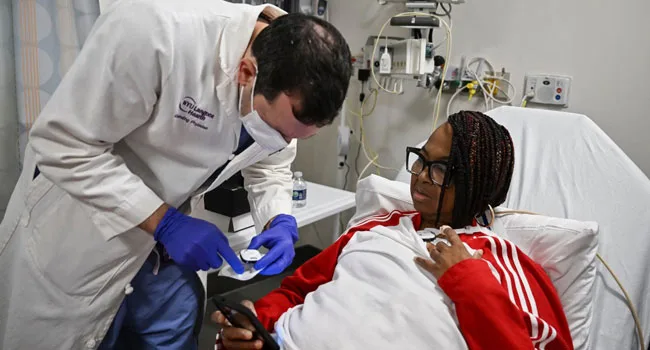Towana Looney donated a kidney to her mother in 1999, only to lose her remaining kidney years later due to pregnancy complications.
Now, the 53-year-old from Alabama has become the first living person in the world to receive a gene-edited pig kidney transplant, announced NYU Langone Health in New York.
“I’m overjoyed, I’m blessed to have received this gift, this second chance at life,” Looney said during a press conference, three weeks after the procedure.
Xenotransplantation, the transplanting of organs from one species to another, has long been a scientific aspiration. Although early experiments on primates failed, advances in gene editing and immune system management have made the dream increasingly feasible.
Pigs have emerged as the ideal donors: they grow quickly, produce large litters, and are already part of the human food supply.
This approach holds promise for addressing the severe organ shortage in the U.S., where more than 100,000 people are awaiting transplants, including over 90,000 needing kidneys.
A final hope
Looney had been undergoing dialysis since 2016, a grueling eight-year struggle. High blood pressure from preeclampsia had caused chronic kidney disease, and despite being prioritized on transplant waiting lists as a living donor, she faced dead ends due to her body’s high antibody levels, which made rejection almost inevitable. As her health declined and dialysis became less effective, Looney turned to a clinical trial for pig kidney transplants and underwent a seven-hour surgery on November 25.
“I’m full of energy, I’ve got an appetite… and I can go to the bathroom!” Looney exclaimed afterward, laughing. “I haven’t been able to do that in eight years! I’m even planning to celebrate at Disney World.”
Dr. Jayme Locke, a surgeon on the transplant team, marveled at the results. “The kidney functioned essentially like a kidney from a living donor,” she said, noting that Looney’s husband noticed a rosiness in her cheeks for the first time in years. “That is the miracle of transplantation.”
Cautious optimism
Looney’s transplant marks the third successful gene-edited pig kidney transplant into a human. The first recipient, Rick Slayman, passed away in May, two months after his procedure at Massachusetts General Hospital. The second, Lisa Pisano, showed early recovery signs after surgery at NYU Langone but had to have the organ removed after 47 days and passed away in July.
Looney, however, was not terminally ill prior to her transplant, which gives this case unique significance, according to Dr. Robert Montgomery, who led the surgery. Each case, he stressed, provides valuable lessons for refining these groundbreaking techniques.
The gene-edited kidney Looney received underwent 10 genetic modifications to improve compatibility with the human body — an improvement over earlier versions that had only one genetic modification. These kidneys also included the pig’s thymus gland to help train the host’s immune system and prevent organ rejection.
Montgomery, who performed the world’s first gene-edited pig organ transplant in 2021, believes both methods will likely enter clinical trials by next year.
“This is a watershed moment for the future of transplantation,” said Kevin Longino, CEO of the National Kidney Foundation. A recent poll conducted by the nonprofit showed that patients and families are eager for faster clinical trial progress, believing that the risks of inaction outweigh the uncertainties of xenotransplantation.
Looney was discharged on December 6 to a nearby New York City apartment. Though her high antibody levels still pose a concern, doctors are closely monitoring her with wearable technology and a novel drug regimen to prevent rejection. While periodic hospital visits may be required, the team remains hopeful she can return home in three months.
AFP


